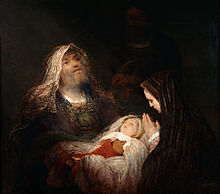 |
| "Simeon's Song of Praise" Aert de Gelder (ca. 1710) |
“Master, now you are dismissing your
servant in peace, according to your word; for my eyes have seen your salvation,
which you have prepared in the presence of all peoples…” (Luke 2:29-31)
I really love the gospel appointed for
Christmas 1, Year B in the Revised Common Lectionary (Luke 2:22-40). Granted, I
don’t often give myself the opportunity to preach on it. In years past I’ve
kind of figured that good American Lutherans, wiped out by the bacchanal of the
Yule, always want to sleep in on the Sunday after Christmas and nurse their
sugar-cookie hangovers. Church attendance goes into the dumper on this Sunday.
Subsequently, I’ve often taken this Sunday off and not taken the time to
prepare a message on the beautiful passage the lectionary gives us. That’s too
bad, because the imagery in this lesson is really exquisitely lovely. At least I think so.
Liturgical purists will recognize verses
29-32 as the Nunc Dimittis, a
canticle that’s part of evening worship settings such as Compline or Evensong.
For a Lutheran like myself it’s more familiar as the canticle sung right after
the reception of the Holy Eucharist. In our gospel, Simeon, a pious and devout
Jew who believed he wouldn’t die until he’d seen the Messiah, cradles the baby
Jesus in his arms and tells God he’s now ready to hang it up. It’s actually a
joyful and thankful admission, so it’s appropriate that we sing it right after we’ve encountered Jesus in the Lord’s
Supper. You can find musical arrangements of this prayer in Evangelical Lutheran Worship’s first two
settings of the mass (ELW pg. 113 and pg. 134 in case you want to look it up).
Personally, I wish we’d include it in all settings.
I mean, how cool is this image? Here’s an old dude at the end of his life
hugging a little baby boy at the very beginning of his. The old geezer is
thanking God that his tradition is going to live on after him. He’s taking joy
in the life and vitality he no longer has but knows this child will enjoy. As a
cleric who has officiated hundreds of funerals, I can’t even count the number
of times family members of the deceased have expressed gratitude that their elderly
relative lived long enough to see a grandchild or great-grandchild born. It’s
an affirmation of life itself.
This gospel lesson also celebrates the
wisdom of the elderly. I’ve had Simeons and Annas in my congregation, and there’s
something to be said for vintage Christians who have lived lives of prayer,
learned mercy and forgiveness, and have figured out that you don’t need to take
all the crap so seriously. Simeon and Anna know
who Jesus is, and because they know, they are full of optimism for that which
is to come.
(By
the way, an interesting little—but certainly not unimportant—detail in this
story is found at verse 24. Mary and Joseph, expected to either give their
firstborn son to God per the statues in Exodus 13 or redeem him at a price,
come to the Temple to do the latter. I find it significant that the sacrificial
price for the Redeemer of the World is only two lousy pigeons. Since there was
no Republican tax plan in New Testament times, I’m assuming that the low price
was offered to those of limited means, and that rich folks were expected to
make grander sacrifices—like a cow or a sheep—as their means permitted. By
including this detail, Luke reminds us that our Savior came from the peasant
class. Jesus loves the poor because he was poor himself!)
This gospel lesson is both celebration and
foreboding at the birth of this child. Any parent gets this. Having been in my
current parish for almost two full decades, I’ve had the privilege and delight
of watching a whole bunch of whacky kids grow into adulthood. At Christmastime,
they all come back to go to church with their parents and grandparents. The
first baby I baptized from this congregation now speaks with a bass voice and
towers a good head taller than his pastor. I love seeing them, love hearing
about what they’re up to, and love the fact that they still show up for worship—if
only once or twice a year.
BUT: Like every parent, my joy is also
coupled with worry. When two lads I’ve known since they were rug rats put on
the uniform of the United States military, I’m filled with both pride and
dread. When the adorable little girls set off for college, I start thinking
about the unsavory tales I’ve heard about campus parties and sexual assault. Over
the years I’ve been so very well-pleased by the accomplishments of my “church
kids,” but I’ve been saddened by their misadventures, too.
Simeon tells Mary that Jesus will be destined
for the “falling and rising of many in Israel” (verse 34), but a sword will
also pierce Mary’s heart. With the child’s greatness will come opposition and
sorrow. It cannot be otherwise.
As we embrace the baby Jesus, we’ll find
in his gentleness and humility our own sense of identity and, for want of a
better word, pride. But we will also
find opposition, and we will hurt along with him.
I dearly hope that this sense of hurt does
not
stem from cultural indignation. Personally, I couldn’t give a rat’s ass if we
say “Merry Christmas” or “Happy Holidays” here in America. I don’t care if we
don’t have “In God We Trust” on our currency or the Ten Commandments on our
courthouse walls. I care when the ones Christ came to save are violated. When
God’s children become refugees, or heroin addicts, or are incarcerated, or are
dying from war-related famine—that’s when the sword should pierce the heart of
the Christian. And, I guarantee you, any attempt to address these situations
will certainly bring opposition from someone.
At such moments of opposition it might be
a good idea to remember dear old Simeon. He believed the promises of God, and
we will, too. So we hold onto the baby Jesus, give thanks, and move forward
into a new year.


